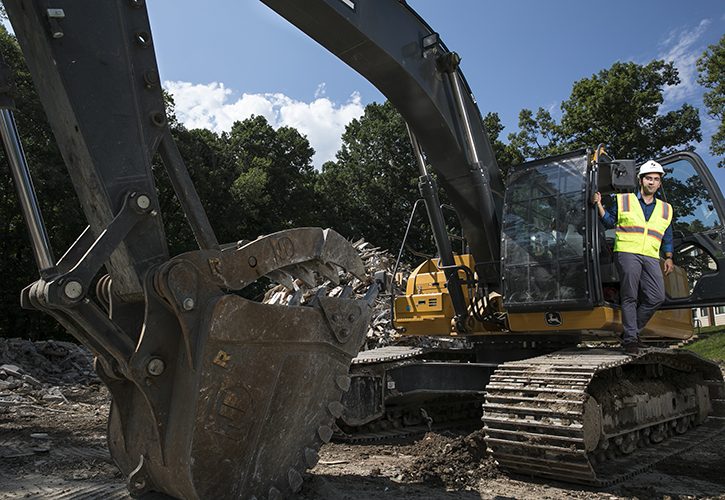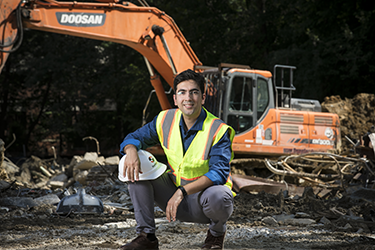
Pouya Gholizadeh, a PhD student in civil engineering, is reviewing federal government data to determine the causes of construction accidents and fatalities. Photo by Ron Aira

Civil engineering doctoral student Pouya Gholizadeh hopes his research on the safety of construction sites saves lives. Photo by Ron Aira
When Mason Engineering doctoral student Pouya Gholizadeh was walking near his apartment complex in Fairfax recently, he was alarmed to see a construction employee on the roof of a building working without a hard hat or any safety system that would protect him if he fell.
Gholizadeh knew this was an accident waiting to happen, and he has the research to back it up.
As a PhD student in civil engineering, he is reviewing federal government data to determine the causes of accidents and fatalities on construction sites. “The safety of construction workers is unfortunately not the best,” he says.
His interest in this field dates back to his childhood growing up in Iran when he went with his father to his uncle’s construction sites, including homes and small apartment complexes. “As a kid, it fascinated me how a few men can work together and build something brick by brick.”
Gholizadeh earned a BS in architectural engineering and an MS in project and construction management in Iran. He went on to get an MS in construction management with a minor in statistics from the University of Nebraska-Lincoln (UNL).
He was working on his PhD with Behzad Esmaeili at UNL when Esmaeili decided to take a job as an assistant professor with Mason’s Sid and Reva Dewberry Department of Civil, Environmental, and Infrastructure Engineering.
Gholizadeh decided to come as well. “I’m happy with this decision,” he says. “I like the vibrant environment of Mason and the interdisciplinary programs at the Volgenau School of Engineering.”
After he graduates in May 2019, Gholizadeh would like to continue to do research and teach at the college level.
He hopes his work saves lives. “At the end of the day, we want to provide good information to safety managers on construction sites, so they can make better decisions and mitigate accident outcomes.”
His story appears in the fall issue of Mason Spirit magazine.
“At the end of the day, we want to provide good information to safety managers on construction sites, so they can make better decisions and mitigate accident outcomes."
— Pouya Gholizadeh, doctoral student in civil engineering
